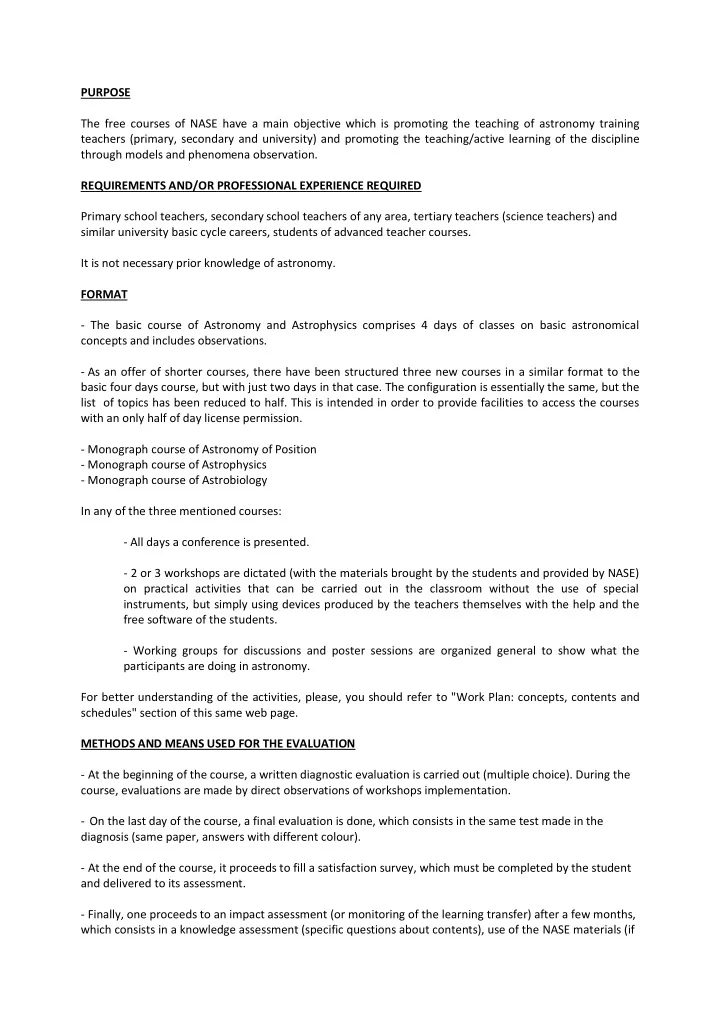

PURPOSE The free courses of NASE have a main objective which is promoting the teaching of astronomy training teachers (primary, secondary and university) and promoting the teaching/active learning of the discipline through models and phenomena observation. REQUIREMENTS AND/OR PROFESSIONAL EXPERIENCE REQUIRED Primary school teachers, secondary school teachers of any area, tertiary teachers (science teachers) and similar university basic cycle careers, students of advanced teacher courses. It is not necessary prior knowledge of astronomy. FORMAT - The basic course of Astronomy and Astrophysics comprises 4 days of classes on basic astronomical concepts and includes observations. - As an offer of shorter courses, there have been structured three new courses in a similar format to the basic four days course, but with just two days in that case. The configuration is essentially the same, but the list of topics has been reduced to half. This is intended in order to provide facilities to access the courses with an only half of day license permission. - Monograph course of Astronomy of Position - Monograph course of Astrophysics - Monograph course of Astrobiology In any of the three mentioned courses: - All days a conference is presented. - 2 or 3 workshops are dictated (with the materials brought by the students and provided by NASE) on practical activities that can be carried out in the classroom without the use of special instruments, but simply using devices produced by the teachers themselves with the help and the free software of the students. - Working groups for discussions and poster sessions are organized general to show what the participants are doing in astronomy. For better understanding of the activities, please, you should refer to "Work Plan: concepts, contents and schedules" section of this same web page. METHODS AND MEANS USED FOR THE EVALUATION - At the beginning of the course, a written diagnostic evaluation is carried out (multiple choice). During the course, evaluations are made by direct observations of workshops implementation. - On the last day of the course, a final evaluation is done, which consists in the same test made in the diagnosis (same paper, answers with different colour). - At the end of the course, it proceeds to fill a satisfaction survey, which must be completed by the student and delivered to its assessment. - Finally, one proceeds to an impact assessment (or monitoring of the learning transfer) after a few months, which consists in a knowledge assessment (specific questions about contents), use of the NASE materials (if
the same were used in the curricular spaces, how often and depth). This evaluation is made by a especially prepared questionnaire for this course, which can be answered by Internet and online, and that provides immediate results that will allow you to keep statistics and impact studies up to date. OBLIGATIONS AND RESPONSABILITIES OF THE STUDENTS - Attendance at least 80% of the course activities. - Attend the course with all the necessary materials for carrying out the activities of mockup, models, etc. One or two weeks before the start of the course, students will be informed of the materials list required, by email to the registered participants. OBLIGATIONS AND RESPONSABILITIES OF NASE The course is totally free for the participants. The infrastructure, logistics and other elements or resources associated to the dictation of the course are provided by the local organization. In relation to the materials required for the development of the workshops, NASE provides: - A list of perishable or supplies elements for the participants: these are provided by the local organization. The list of these elements is published on the NASE web site, in the language of the country (Section "Elements list” on the NASE web page). - Photocopies for the workshops development, the file shall be selected in accordance with the latitude of the place in which they performed the course. The files are available in the NASE web page, in the language in which it was done the course. (This material should be delivered printed to participating teachers). - Reference Material: Each participant receives (in the first day of the course) a CD with the records that collect the conferences and workshops: texts and PowerPoint presentations of the books: 14 steps to the Universe, Geometry of lights and shadows, Cosmic Lights, and the digital material that you need to carry out the course (including the astronomic software that is recommend). All is available on the NASE web page. SUPPORT FOR TRAINING - Teachers in primary and secondary schools can find useful supporting documents for their activities in the school in the NASE web page, "Supplementary material" section. - The materials have been produced in several languages (currently English, Spanish and Portuguese). DISSATISFACTION OF ANY OF THE PARTIES CONCERNED In case of conflict or disagreement, we will proceed to the resolution of that conflict by a Nonconformity approach, which will give an Immediate Solution and finally a Corrective Action. CERTIFICATES NASE provides a certification of international scope. The certificate is nominative, with the dni number if this is required, with the accrediting of being a work group of the IAU, International Astronomical Union, and with the backing of local institutions in each country, and in the case of the Argentine Republic, the CONICET. This certificate is given to the students who have participated (minimum) in 80% of the course activities.
PARTICIPANTS AND INSTRUCTORS Participants will be between 40 and 50 teachers in primary and secondary education in the host country. Instructors will be members of NASE and 6 to 8 teachers of the host country/city. The greatest achievement of NASE is the formation of a local group (GNL) that follows the organization of courses and other activities, and that is autonomous in 2 or 3 years. Local instructors are part, immediately, of the NASE local group and are responsible for performing regular meetings to maintain the activities of the group. The language of the course will be the official language in the host country.
Recommend
More recommend